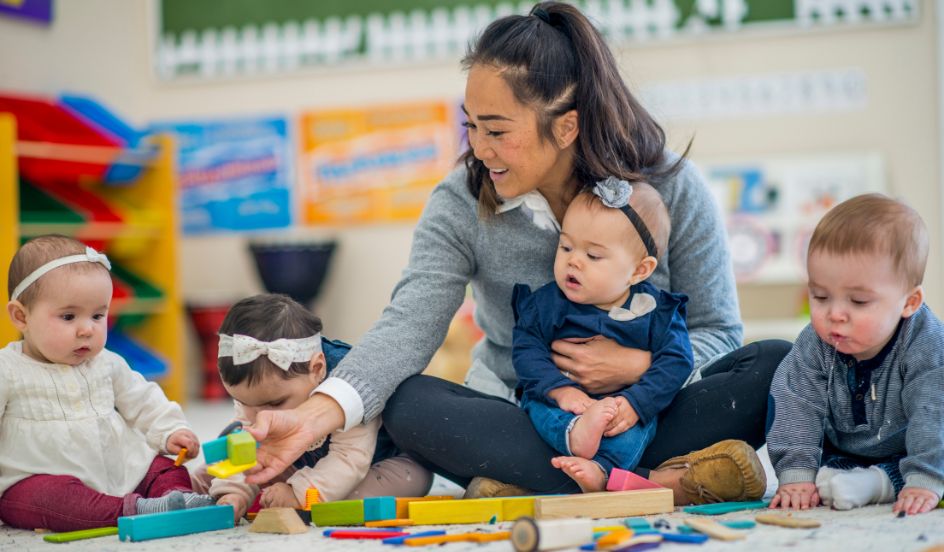Role of Early Childhood Educators
December 21st, 2022
Developmental milestones mark each stage of early childhood, which lasts from birth to about eight years old. Early childhood education typically focuses on children from infancy to kindergarten and includes all formal and informal education structures provided to young children. The educational experience they receive during this time plays a crucial role in their development and profoundly influences their future, as this is when they develop the interests that often remain with them throughout their lives. Providing support and guidance to young children is integral to early childhood education.

Early Childhood Education plays a significant role for young children as this is the period when they develop the interests that often stick with them for life.
Early Childhood Educator Job Description
An Early Childhood Educator (ECE) specializes in the care and education of infants and young children. An Early Childhood Educator plans, organizes, and facilitates activities for children to stimulate and nurture their physical, mental, and emotional development and provide structured and unstructured play opportunities and activities. ECEs don’t just focus on academics but also on social, motor, and life skills in a safe and comfortable environment that promotes learning. Early Childhood Educators often work in daycares and preschools, where they are some of the most influential figures in a child’s life.
Early Childhood Educators play an important role in children’s development and their ability to assist families. Knowing their children are in safe hands allows families to work full-time, increase their income, and enhance their children’s future potential.
Typical Day for an Early Childhood Educator
A typical day for an Early Childhood Educator will look different depending on their work setting, such as a school, daycare, hospital, or private home. To help accommodate the working schedules of parents, some facilities offer a variety of flexible schedules which means the hour of care will depend on the needs of the facility and employer. Overnights, shift work, holidays, evenings, and weekends are all possible.
A typical day can consist of:
- Organizing smooth transitions (drop-offs and pick-ups)
- Preparing meals and snacks
- Helping with hygiene
- Structured and unstructured playtime
- Educational experiences
- Facilitating nap and rest periods

Children can develop creativity and self-expression through stories, singing, art, drama, music, and physical activity.
The Role of an Early Childhood Educator
Regardless of the work setting or hours, Early Childhood Educators play a crucial role in helping children develop and learn. It is their role to engage the child thoroughly to allow them to be their authentic selves and be a part of their educational experience. The following are some of the things an ECE does:
Incorporate Social Connections: Teaching children teamwork to help cultivate friendships, social connections, and good communication.
Educate: Create and implement a learning curriculum that provides hands-on learning experiences and supports and promotes the academic, physical, emotional, and social development of children.
Inspire and Motivate: By interacting with children and engaging them, ECEs make learning fun and enable children to express themselves. ECEs help to motivate children to succeed by recognizing their achievements and celebrating their milestones.
Encourage Creativity and Self Expression: Early Childhood Educators’ role is to inspire children’s creativity and self-expression through storytelling, singing, art, drama, and music.
Teach Self Care: Providing guidance and assistance to children regarding eating, dressing, and toilet habits. Preparing healthy snacks and teaching children about nutrition and self-care.
Provide a Positive Learning Environment: Creating an environment that is healthy, safe, and conducive to children’s learning.
Overseeing development: Helping promote independence and fundamental problem-solving skills encourages children to meet developmental milestones. ECEs help to determine if a child has any developmental challenges by observing and evaluating them and communicating this information to management or parents.
How Much Do Early Childhood Educators Make?
An Early Childhood Educator’s salary will vary depending on their work setting, experience, and qualifications. According to workingincanada.gc.ca, the average salary for an Early Childhood Educator in New Brunswick is $16 an hour, with the high range of $18 an hour.

More families require both parents to work, creating more job opportunities for Early Childhood Educators.
Early Childhood Education Skills
While an Early Childhood Educator can work in many different capacities with children, employers look for candidates who possess both personal and professional skills when working with children. During the job-search process, you can highlight some of these skills on your resume and cover letter to demonstrate how you can benefit the children in your care once hired.
Lots of Patience: Children pick up on the emotions of their environment, so having patience when things get messy, a child is having a meltdown, or they aren’t listening, will help keep the situation calm and bring reassurance to the child.
Imagination and Creativity: Early Childhood Educators use creativity daily to allow children to explore the world through play, so it is crucial to have a creative mindset.
Good Planning and Organization: Being organized is an important skill for an ECE. Setting up a good routine and keeping the space well organized helps to create an engaging and safe learning environment for children.
Passion: Having enthusiasm for teaching little ones is key, as it will help keep the children engaged and motivated to learn.
Good Communication: For children to understand new concepts and expectations, effective communication is necessary. Helping children develop good communication skills is an important part of being an ECE.

In order to keep children engaged and motivated to learn, Early Childhood Educators must be enthusiastic about teaching them.
What Are the Benefits of Becoming an Early Childhood Educator?
Early Childhood Educators must be passionate about working with children and committed to a rewarding career. ECEs enjoy many advantages in their professional and personal lives. Here are some benefits:
- With more families requiring both parents to work, the need for more Early Childhood Educators will continue to rise, creating more job opportunities
- Taking on various responsibilities as an ECE will help keep multitasking and organizational skills at their peak, which will be beneficial both professionally and personally
- Working with young children, playing, creating, and experiencing some of the childhood fun again, helps keep you feeling young at heart and your imagination fresh
- Through teaching about good hygiene and nutrition, the opportunity to set a child on a path to good health for a lifetime is rewarding and encouraging
- Knowing you have positively impacted a child’s life is one of the best perks of working as an Early Childhood Educator
How to become an Early Childhood Educator
Do you have a passion for working with children? Enroll in Eastern College’s Early Childhood Education Diploma program. The ECE program prepares students to promote children’s mental, physical, social, and emotional development and nurture their growth. This 61-week program offers real-world experience in an 8-week internship that allows students to apply theories through a hands-on approach. Students build skills in developing programs and curriculum that promote a child’s positive development. By offering New Brunswick-specific courses, graduates of this program can pursue meaningful careers in the ECE field and positively impact the lives of children in their communities.
Visit Eastern College’s Early Childhood Education Diploma program page to learn more.
